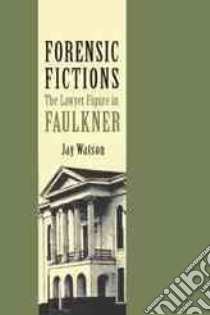Forensic Fictions - 9780820333656
Un libro in lingua di Jay Watson edito da Univ of Georgia Pr, 2008
- € 21.20
- Il prezzo è variabile in funzione del cambio della valuta d’origine
To trace the biographical and historical roots of Faulkner's lifelong preoccupation with the legal profession, Watson draws on contemporary scholarship in narrative, rhetoric, jurisprudence, legal and intellectual history, literary theory, and Lacanian psychoanalysis. His approach yields insightful readings of forensic characters and scenes from such works as "An Odor of Verbena," The Hamlet, "Wild Palms," Absalom, Absalom! and The Reivers.
Watson shows the links between storytelling and the competence of Faulkner's legal characters by examining the intertextual logic that connects the two most important lawyers in the Yoknapatawpha fiction: the incompetent Horace Benbow and the more capable Gavin Stevens, whose entrance into Faulkner's oeuvre coincides with Benbow's untimely departure from it. Focusing on the nine novels in which these two characters appear, Watson traces the evolutionary process by which Stevens supplants Benbow. Three of the Stevens novels--Intruder in the Dust, Knight's Gambit, and Requiem for a Nun--from what Watson calls Faulkner's "forensic trilogy" and, when read together, constitute the writer's most sustained investigation of the rhetorical and ethical responsibilities of the lawyer-citizen.
Faulkner, Watson argues, saw the forensic figure as a potential hybrid of homo loquens and homo politicus, capable of combing the roles of storyteller, rhetorician, and theatrical performer with those of critic, citizen, and ethical man. As such, this figure served as a provocative authorial surrogate through whom Faulkner could explore diverse and often contradictory aspects of his personal experience, his family background, his cultural heritage, and, most of all, his own artistic use of language.
Informazioni bibliografiche
- Titolo del Libro in lingua: Forensic Fictions
- Sottotitolo: The Lawyer Figure in Faulkner
- Lingua: English
- Autore: Jay Watson
- Editore: Univ of Georgia Pr
- Collana: Univ of Georgia Pr (Paperback)
- Data di Pubblicazione: 01 Novembre '08
- Genere: LITERARY CRITICISM
- Pagine: 288
- Dimensioni mm: 234 x 152 x 19
- ISBN-10: 0820333654
- EAN-13: 9780820333656


